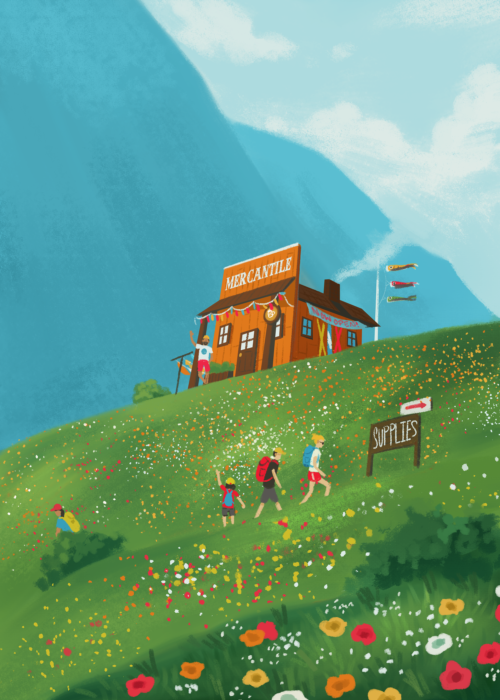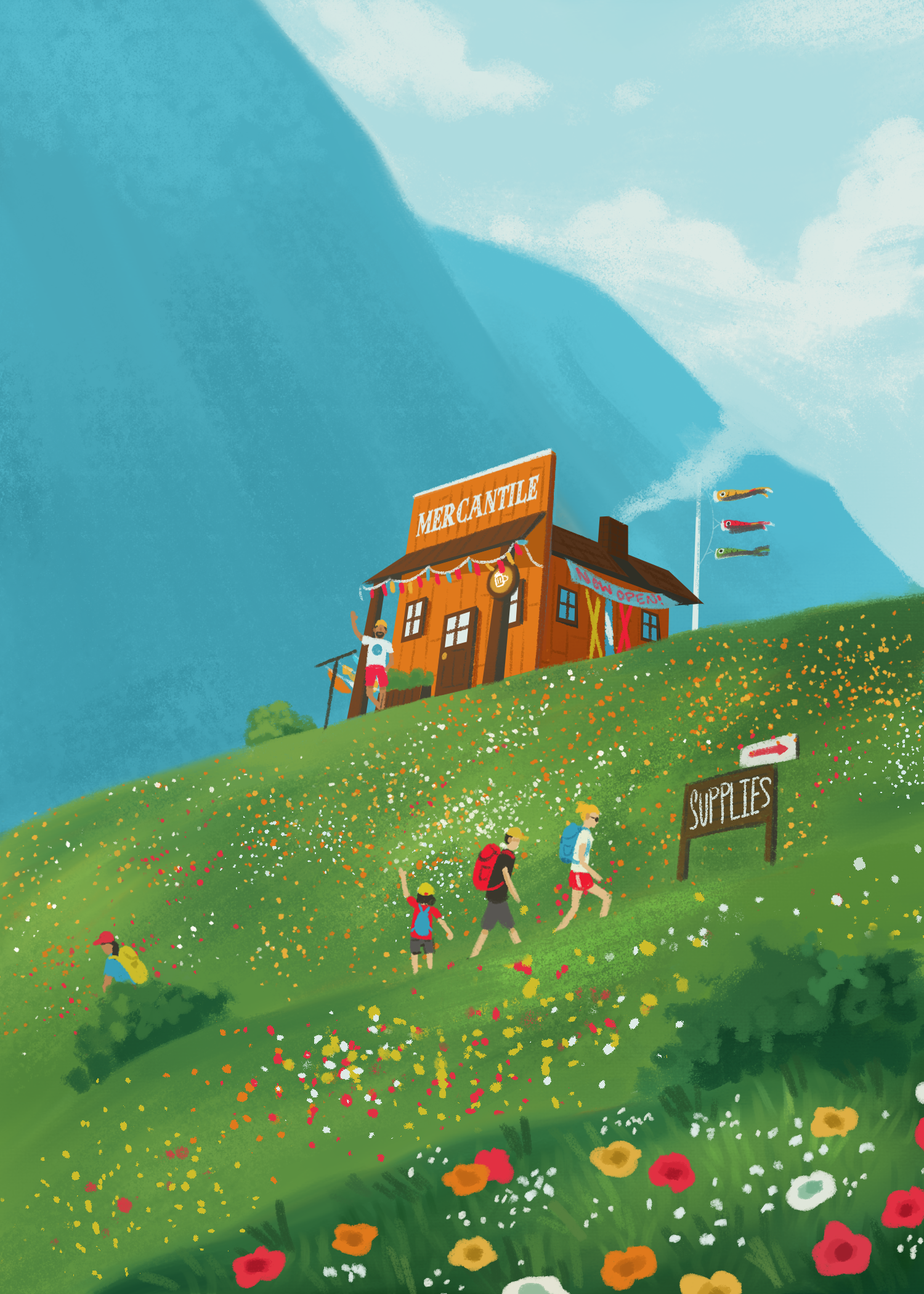
Amelia Hagen-Dillon’s legs and arms were scratched after a long day hiking overgrown trails. She sat down at her computer to enter data collected on the hike, and a new line emerged on the screen before her. It followed a river, skirted a ridgeline, crossed a mountain pass. This would become one of many trail maps that she and her husband, Jamie Robertson, have made for Cairn Cartographics, the company they started in Missoula, Montana, in 2010.
The work might leave her sore, but charting trails she hikes herself sets Hagen-Dillon’s maps apart. By coupling aerial imagery and GIS software with boots-on-the-ground tactics, she and Robertson ensure they get their maps right.
Hagen-Dillon gets to be an athlete, a scientist, and an artist during a day’s work, but Cairn was born in no small part out of necessity. In 2009, the heart of the recession, Hagen-Dillon spent an entire winter in Missoula unable to find a job. She couldn’t even find a service industry gig, she said. “We knew there was a need for updated wilderness maps, so we decided to go for it.”
Towns such as Missoula are known for their high quality of life. Neighborhoods are beautiful, trails are nearby, and much of the town flees for the ski hill on powder days. Yet as tech firms, remote workers, and affluent retirees move in search of this very lifestyle, some locals are getting priced out. Skiing, hiking, and mountain biking cost money, and they just don’t pay the bills.
Or do they? Some like Hagen-Dillon are finding ways to turn outdoor hobbies into jobs that allow them to stay in the West’s most in-demand burgs.
“The attraction of these communities is, in some ways, their own biggest challenge,” said Clif Harald, Executive Director of Boulder Economic Council in Boulder, Colorado. A rising cost of living is becoming increasingly common in mountain towns, and more — and more affluent — people seeking them out reinforces the price hikes. Toss in the preservation of open space nearby, as with Boulder County’s 40,000-plus acres, and restrictive zoning that protects valuable mountain views and single-family homes, and prices ratchet up even further. It’s basic supply and demand, Harald said.
Making ends meet in these places requires some creativity. Sara Campbell started Sturdy Pine Gear and Repair, which makes and fixes river equipment, to smooth out the seasonal swings of employment in Salmon, Idaho, where she lives. Campbell had worked for years as a raft guide each summer, but struggled to find anything other than low-paying, unfulfilling work during the winter, when rafters and fishers went home.
Campbell, a trained engineer, brainstormed business ideas often, but wasn’t willing to make a change that meant leaving Salmon. Then she came up with the idea of making durable, high-quality river gear.
“I like working with my hands and having a tangible product. Sewing seemed feasible, seemed to match the direction I wanted my life to go,” Campbell said.
She found a sewing machine on Craigslist and taught herself to use it in part by tearing apart old bags to learn basic designs. In 2017, Sturdy Pine was born.
Campbell’s business is more than bags. She makes custom gear for several rafting companies, and repairs tents, drybags, straps, and whatever else outfitters need fixed. With some 9,000 river runners floating the Salmon each year, Campbell said she has plenty of room to grow, and Sturdy Pine earns her more than she’d likely make elsewhere in Salmon, where the median household income is about $28,600.
Bedrock Bikepacking Bags of Durango, Colorado, came about for similar reasons. Co-owners Joey Ernst and Andrew Wracher were passionate about their hobbies, but tired of low-paying jobs and a seasonal lifestyle.
Wracher, an avid cyclist who worked a seasonal field job at the time, made his first set of bikepacking bags as an experiment in 2012. The bags, which fit into the frame of a bicycle to allow for multi-day backcountry trips, were an unusual product back then. Ernst had just opened his own bike shop, Velorution Cycles, so Wracher brought his new gear in to get Ernst’s opinion.
“I told him they were great, and I’d sell them,” Ernst said.
For several years, Wracher made bags at his house, and Ernst sold them at Velorution. As the businesses grew, both men suffered long hours with few days off, so in early 2016 they decided to officially partner up. A year later, they sold the bike shop to focus just on Bedrock.
Today, the majority of Bedrock’s sales occur online, and almost all bags are purchased by out-of-town buyers. Ernst and Wracher have four employees who earn an average hourly pay of $22, compared with Durango’s $16.70 average. Bedrock’s challenge is to stay competitive without losing sight of the original goals of the business.
“Lifestyle is our number-one driving motive, not profit, and we’re comfortable with the concept of enough. We don’t want to treat people like numbers: not our employees, and not our customers,” Ernst said.
Entrepreneurs like Hagen-Dillon, Campbell, Wracher, and Ernst may have found ways to make ends meet in the changing economies of these small mountain towns, but the path isn’t for everyone. Rachel Mockler moved to Missoula in 2012 to attend graduate school, but spent three years working low-paying jobs. “I love Missoula, the community especially,” she said. “But financially, it’s just so hard. People just kind of scrape by.”
Mockler left Montana for Portland in late 2015. Three years later, she started her own business, the landscaping and design firm Queen Green Gardens. Business, Mockler said, is taking off, thanks in part to her location in a more urban environment. In Portland, she was able to find grants, educational programs, and a community of other entrepreneurs that helped her start her business.
“I don’t think I could have a landscaping business and do as well as I’m doing in Portland, in Missoula,” Mockler said. “I feel like I make two to four times more here than I did [in Montana]. It’s crazy. It’s been insane.”
Hagen-Dillon and Robertson, of Cairn Cartographics, have experienced some of the insecurity Mockler was familiar with. After years of steady growth, Hagen-Dillon said, sales of Cairn’s maps are starting to plateau. While Robertson still helps with maps on the side, Hagen-Dillon is Cairn’s only full-time employee; Robertson took a separate, full-time job in 2015. Their sales fluctuate based on season and weather, which at times, Hagen-Dillon said, is stressful.
But the tradeoff is still worth it. The business allows the couple to do work they’re passionate about in places that inspire them. On a recent weekend, they hiked 50 miles through the proposed Great Burn Wilderness Area in Montana. They camped at a trailhead in the truck camper Robertson spent the last few winters building out, and got to enjoy time together in the mountains. They don’t know what’s around the next corner, but they’re doing what they love in a place they love: Missoula.

